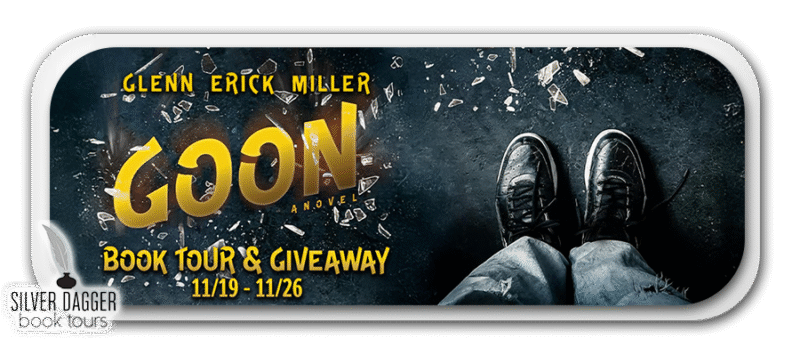
After causing a devastating accident, foster kid Goon is sentenced to a mysterious detention center where he battles crushing guilt, a ruthless bully, and a Cat-3 hurricane as he tries to prove that he deserves a second chance – but he must prove it to himself first.
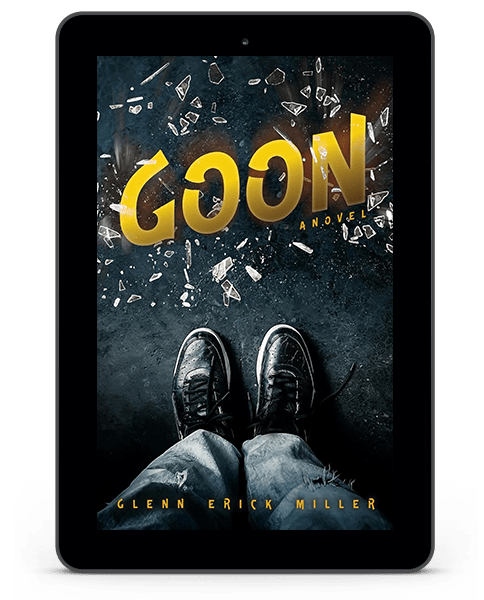
Goon
by Glenn Erick Miller
Genre: YA Fiction

When super-sized foster kid Goon causes a devastating accident, he’s sentenced to an experimental detention center in rural Florida. There, despite his efforts to go unnoticed, his size and sensitivity make Goon a perfect mark for the resident bully.
Assigned to work at the stables, he connects with the rescued horses and his co-worker Trudy, who is entangled in the center’s mysterious past. After Goon suffers a brutal attack, he must confront his tormentor, a raging hurricane, and his own crushing guilt.
Goon dreams of being reunited with his younger brother and tries to prove to anyone who will listen that he deserves a second chance.
But first, he must prove it to himself.
Praise for Goon:
“Goon will break your heart into a million pieces and then put it back together again.”
– Mary Sullivan Walsh, author of High and Dear Blue Sky
“Stunning and poignant, Goon captivates with empathy and love the heart of a character that could easily be misunderstood. Glenn Erick Miller writes poetically and beautifully, and many teen readers will relate.”
– Linda Oatman High, author of One Amazing Elephant
“A powerfully written tale of redemption… One of the best young adult novels I’ve read in a long time.”
– Tim Cummings, Author of The Lightning People Play and Alice the Cat
Amazon * B&N * BooksAMillion * Bookshop.org * Books&Books * Goodreads
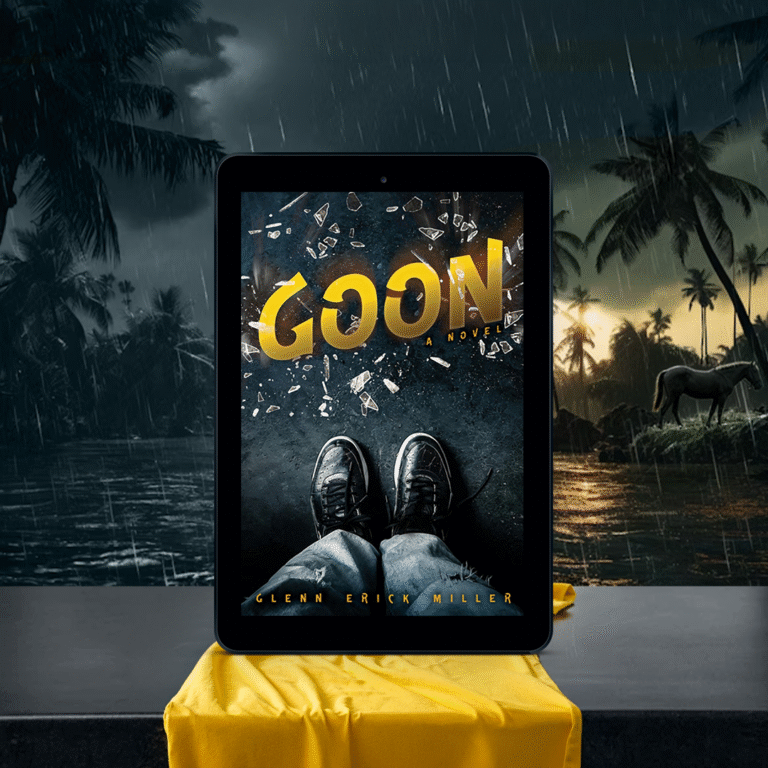
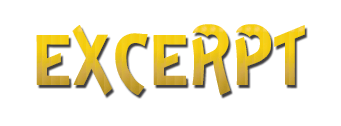
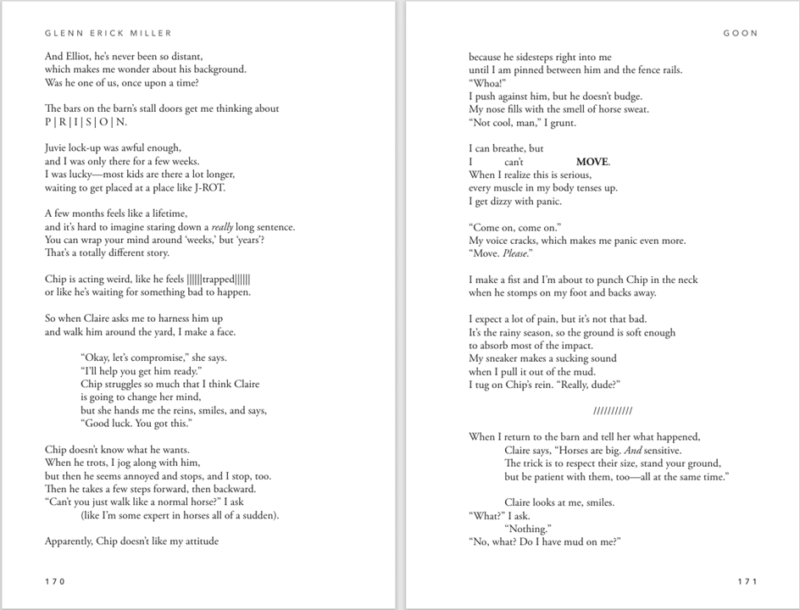
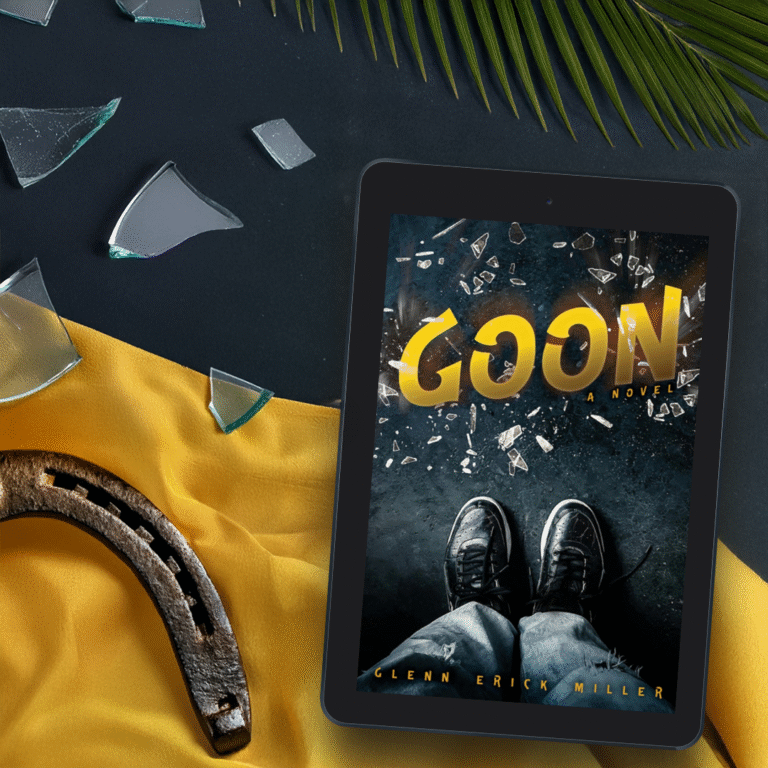

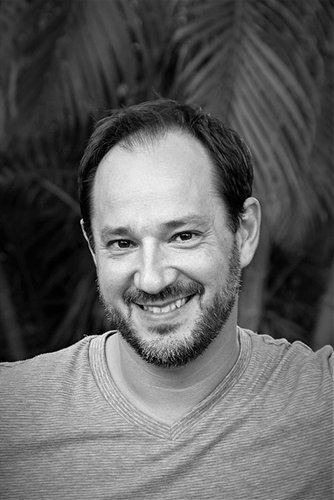
Glenn Erick Miller’s novel, “Camper Girl” (Fitzroy Books, 2020) is the winner of multiple awards including First Place in the Eric Hoffer Book Awards and Bronze Medals in the Florida Book Awards and Moonbeam Children’s Book Awards. It is now available as an audiobook. He is also the author of a picture book, “Red’s First Snow” (Corn Crib Publishing, 2020), and his writing has earned a First-Place Rising Kite award from Florida SCBWI and a Pushcart Prize nomination.
Website * Facebook * Instagram * Bookbub * Amazon * Goodreads

What inspired you to write this book?
The character of Goon is a compilation of several teens with whom I’ve worked. The setting is similar to one of my first jobs out of college. I was a teacher’s aide at a school for disadvantaged youth. Along with their classes, the teens were assigned different jobs such as cooking, landscaping, and caring for the resident horses. There were a lot of fights, but there was also some wonderful bonding between the students. “Goon” is a book about forgiving yourself in order to move forward. We are more than one bad decision. Unfortunately, so many teens carry the emotional weight of single moments like saying something stupid or making a dumb choice. These feelings linger in us, like cancer, and can eat us up as we enter adulthood.
What can we expect from you in the future?
I’m working on a sequel to my first YA novel, “Camper Girl.” Hopefully, it will be published in the coming year. After that, I have a few more projects lined up. One is a murder mystery set at a community college. The other is a love story between two outcasts.
What did you enjoy most about writing this book?
“Goon” was a big challenge for me. Initially, nothing I wrote felt right. I struggled with getting my ideas on the page. It wasn’t until I made some sweeping changes that “Goon” took shape in a satisfying way. I changed the narrator, the setting, and the arc. I literally started from scratch. I also tried to write it in verse (poetry), which immediately clicked. From that point on, the writing just kind of flowed. That discovery of finally seeing a way forward is incredibly satisfying. It’s like the gratification you get when you solve a complicated puzzle!
Did you learn anything during the writing of your recent book?
Writing “Goon” reminded me to be patient with myself. Some projects take more time than others, and that’s okay. I also learned that taking chances can lead to good results. It’s not a guarantee, of course, but pushing yourself to try new things helps you to hone your skills and build confidence. It reminds me of a scientist in a lab who runs test after test. It’s a process or journey that you have to enjoy.
What is your favorite part of this book and why?
My favorite part of “Goon” is definitely the camaraderie that the narrator forms with the other boys. Their relationship is really tense at first. Goon tries too hard, makes a lot of mistakes, and feels like an outcast. But when things at the detention center go badly, he earns respect for his leadership. Oak House, in particular, watches out for one another as if they were brothers. Adolescence is really hard to go through, and friends can make it a lot easier.
If you could spend time with a character from your book whom would it be? And what would you do during that day?
I would spend all day playing basketball with Goon and the others—even with T.J. and Sawgrass. They’re not so bad when you get to know them.
Convince us why you feel your book is a must read.
Feeling out of place, confused, or heartbroken are universal experiences. That’s what “Goon” is all about, so I know it will appeal to a wide range of readers. I’ve heard from teens as well as people in their 40s and 70s who say they’ve enjoyed Goon’s story because it reminds them of their own. No matter what pain you’ve felt as a young person, you’re going to connect with Goon as he journeys through grief and toward healing.
What did you edit out of this book?
So much! With each writing project, I’m amazed at how much material ends up on the “cutting room floor.” Characters, entire scenes, and more had to be edited out to make the story stronger. Revising a book is a lot of addition by subtraction.
What are your top 10 favorite books/authors?
To keep this short, I’ll just focus on a few. Louise Erdrich, Jason Reynolds, George Eliot, and Ernest Hemingway are some of my favorite writers.
Favorite books include E. Annie Proulx’ “The Shipping News,” Eliot’s “Middlemarch,” Erdrich’s “Tracks” and “The Beet Queen,” and Reynold’s “Long Way Down.” Last year, I read “God of the Woods” by Liz Moore and am haunted by it. Oh, and Kazuo Ishiguro’s “Never Let Me Go” holds a special place in my heart. Gosh, that book is excellent.
What book do you think everyone should read?
I think everyone can benefit from reading a variety of things. Read a poetry book (Mary Oliver is a good start), then a biography of someone you respect, and then read a novel (sci-fi, romance, mystery, etc.). Switch it up, try different things, and ask your librarian or local bookseller for recommendations. Shakespeare, too. The originals can be challenging, so there’s nothing wrong with reading one of the modern interpretations of his plays to get the essence of his storytelling and insights into the human condition. There’s a reason we still study his work 400 years later.
What do you think about the current publishing market?
Well, AI has certainly upset the market, but there were already a lot of changes taking place in the industry. As fewer people read but more people want to be authors, it’s become increasingly difficult to get an agent or a traditional book contract. Today, the system is clogged up with tons of AI-generated slop. Fortunately, there are more tools to help writers self-publish and market quality books. The traditional method still offers a lot of benefits such as distribution and validation, but the process can be exhausting.
Do you read yourself and if so what is your favorite genre?
I like to read a variety of things. I enjoy sci-fi, poetry, and mysteries (but not horror—I get nightmares). Though I write YA novels, I don’t want to read only YA novels all the time. Right now, I am reading “Project Hail Mary” by Andy Weir. Earlier this year, I read a book of George Saunders’ short stories as well as David McCullough’s “1776.”
Do you prefer to write in silence or with noise? Why?
When writing, I can get easily distracted. Music with words is impossible to listen to, for obvious reasons. Instead, I listen to movie soundtracks like “The Theory of Everything.” The sweeping music reminds me, subconsciously, to write with a lot of rising and falling tension. It helps me tune out the rest of the world and focus.
Do you write one book at a time, or do you have several going at a time?
I’m definitely a one book at a time kind of writer. If I get an idea for something else, I’ll jot it down, but I mainly stay focused on the project in front of me.
Pen or typewriter or computer?
I used to write long-hand and filled tons of notebooks over the years. I handwrite notes and outlines, but not the actual story anymore. Admittedly, I still use index cards to organize my scenes. Spreading them out, I can get a clear sense of the story’s overall arc. These days, I use a computer for most things. I can type a lot faster than I can write (hooray for typing classes!).
I love typewriters and have a few of them, but I only use them to get away from the computer screen. A really cool tool for drafting is the Neo. It’s an old word processor that was used in schools. It’s tough and portable. It’s a self-contained unit with a keyboard and small display. No distractions! Then, you just transfer the files to your computer to edit and revise. The Neo is no longer made, but you can find them on eBay.
Tell us about a favorite character from a book.
Steve Harmon, the narrator in Walter Dean Myers’ “Monster,” is a character that’s stuck with me for years. Both Steve and the book’s structure make for a beautifully complicated reflection on an individual’s sense of self. How does our self-view differ from how others view us? Who are we, really, and what are we willing to admit to ourselves?
Advice for new authors?
I know it’s said all the time, but if you want to be a writer, you have to write. A lot. Specifically, you have to be a student of the craft. Create a reading list of books on craft. As you dive in to them, be humble and open-minded. Look closely at how others have done it. It’s the same with any pursuit, whether you want to play a sport, an instrument, bake, be a magician, etc. As you read and write, you’ll hone your craft. Trust and love the process.
What makes a good story?
Besides having a good beginning, middle, and ending, a good story has to have something unique about it. It could be an unusual setting or job. It could be the structure. Also, even if it’s not a traditional mystery, a good story has to spark our curiosity. It’s fun to wonder what’s going to happen, so we keep turning the page to find out. If the plot is obvious, or if we don’t like the characters, then reading is a struggle.
What are you currently reading?
Andy Weir’s “Project Hail Mary.” The movie is coming out soon, and I want to read the book first.
What is your writing process? For instance, do you do an outline first? Do you do the chapters first?
This is something I’m still trying to figure out! My process is a work in progress.
I like having at least a rough outline, but I also go wherever the story takes me. I’ve tried using a computer program called Scrivener with some success.
One thing I find useful is to make a bulleted list at the beginning of each chapter of things I want to include. It may be a reminder to mention a certain character or to keep my sentences short to underscore the intense action, etc. Also, I’ll list five or so scenes I want to include. This gives me a sense of the chapter’s shape before jumping in.
What are common traps for aspiring writers?
One common trap is not wanting to listen to criticism. You have to grow a thick skin. Take any negative feedback and learn from it. Always be growing and looking to improve your writing. There’s always room to improve. That doesn’t mean that confidence isn’t important. But as much as you believe in yourself, it’s good to also have a healthy amount of humility.
If you could tell your younger writing self anything, what would it be?
Keep your eye on the prize. Stick with it. Don’t get distracted. Write every day, even if it’s just a few paragraphs. However, don’t take yourself too seriously. Nothing good will come from all that pressure you put on yourself.
What’s the most difficult thing about writing characters from the opposite sex?
“Camper Girl” is told from the point of view of a teenager. She’s just graduated high school and embarks on a sort of scavenger hunt of self-discovery. Getting her voice to sound believable was tricky, but the female writers in my critique group offered a lot of helpful suggestions along the way.
How long on average does it take you to write a book?
Some writers I know can pump out a novel every six months. I work a lot more slowly than that. For most of us, writing isn’t a career, so we have to work hard to find the time and energy to put pen to paper. “Camper Girl” took ten years from the moment I began to the moment it was published. “Goon” took about five years. In each case, though, there were several months and even years where the project sat untouched. If I worked steadily, I’d probably have a strong draft within a year.
I’m getting more efficient. My current work in progress took shape over the last two years, but again, that’s not two years of me sitting at the desk and writing for hours every day. I’m not that focused, and I have other interests—and responsibilities—besides writing novels.

Follow the tour HERE for special content and a giveaway!
Nov 19
Kickoff at Silver Dagger Book Tours
Book Bites….with a side of coffee
Nov 20
Inside the Insanity – GUEST POST
Nov 21
Karen J. Mossman- World of Stories
Nov 22
Nov 23
Nov 24
Nov 25
Nov 26
Stormy Nights, Books and Blogging

Looking for more awesome book tours and giveaways to enter? Check out the rest of the Current Tours!
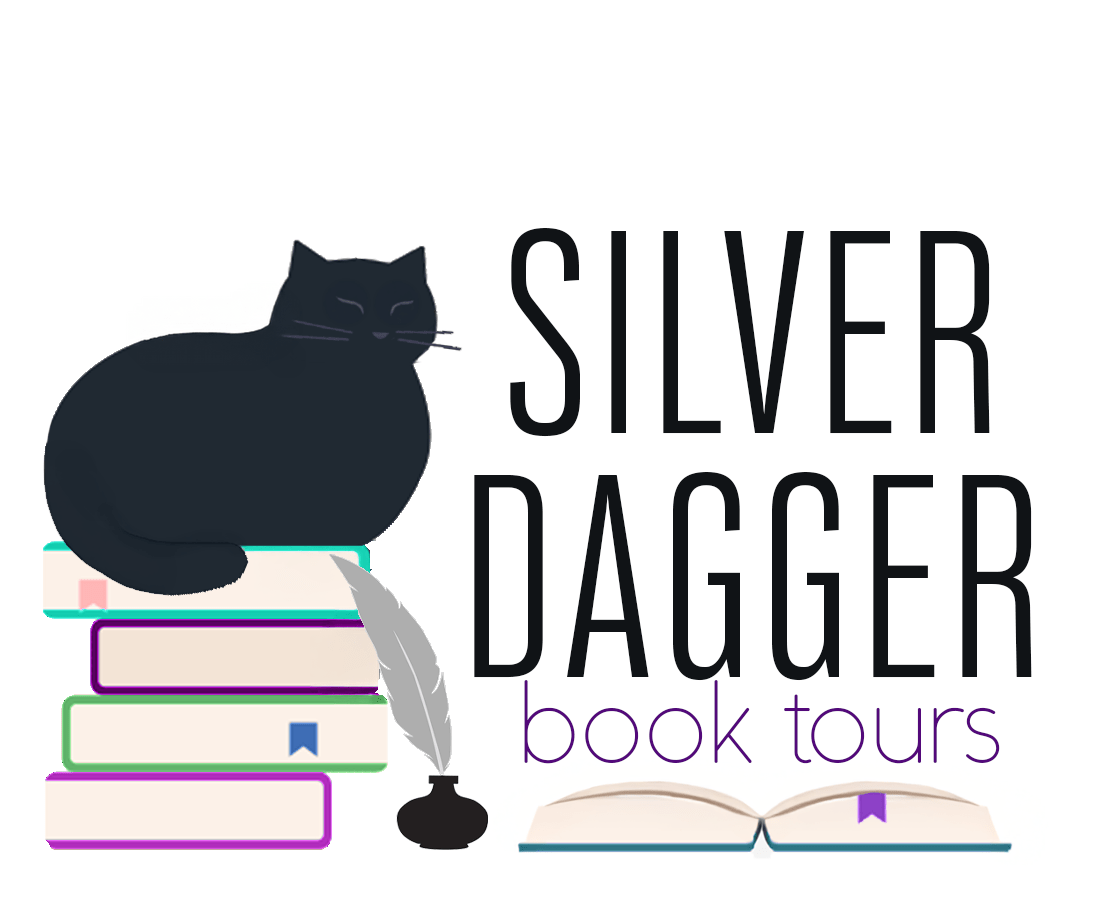

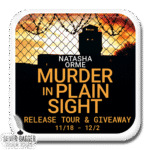

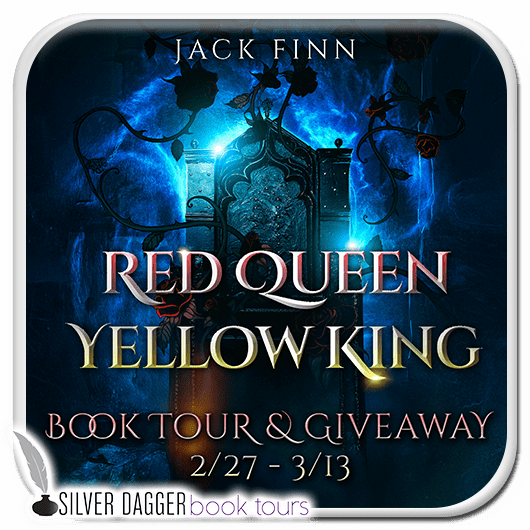
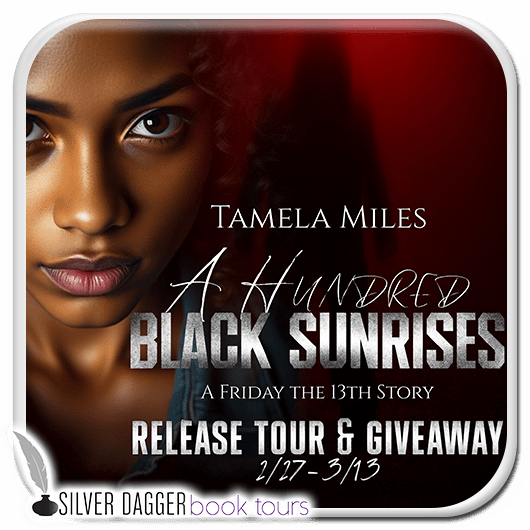
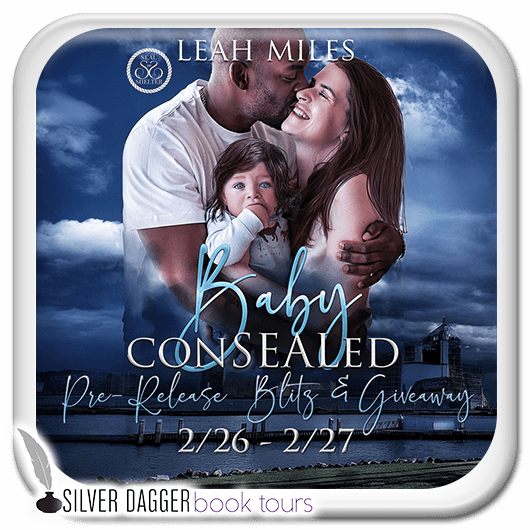
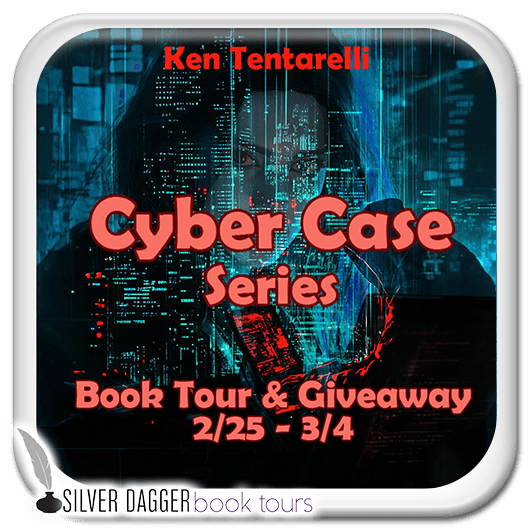
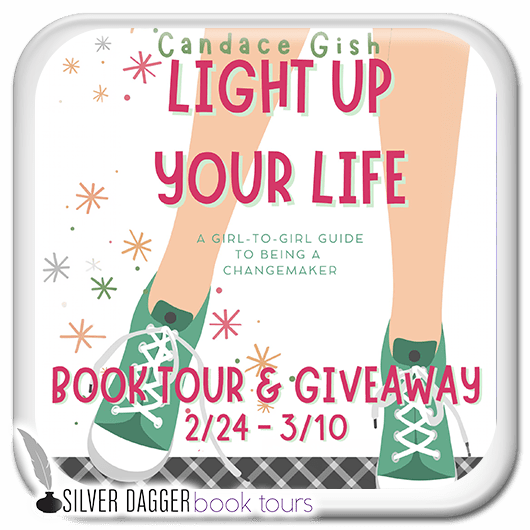
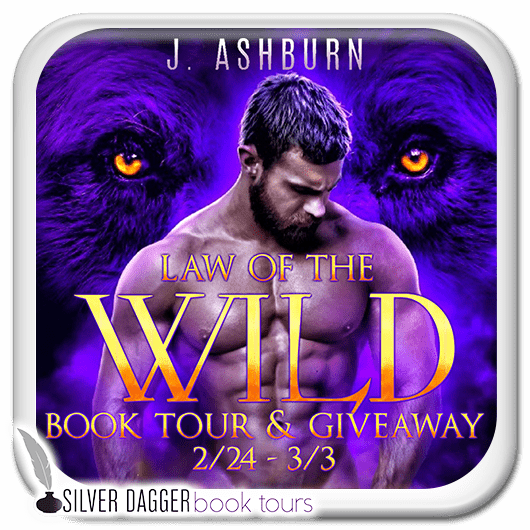
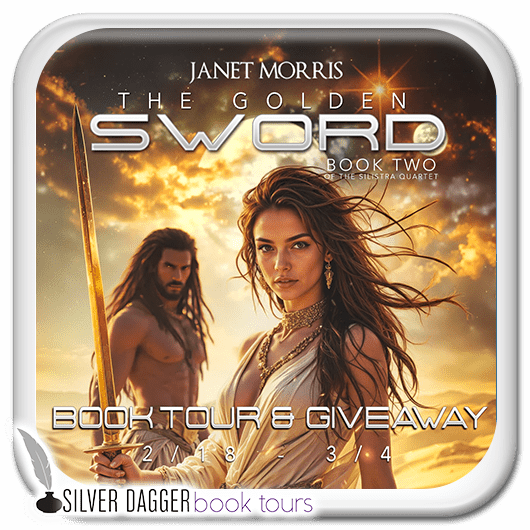
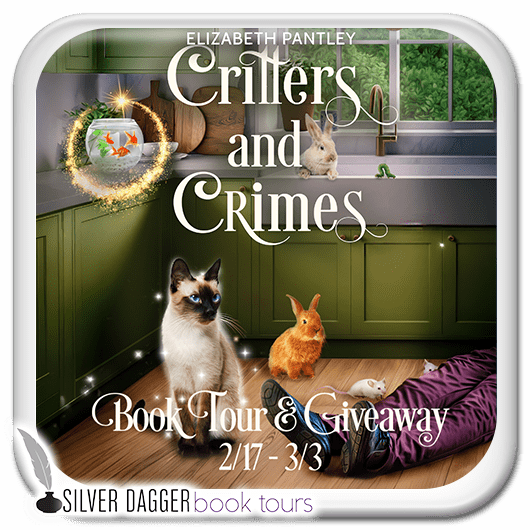
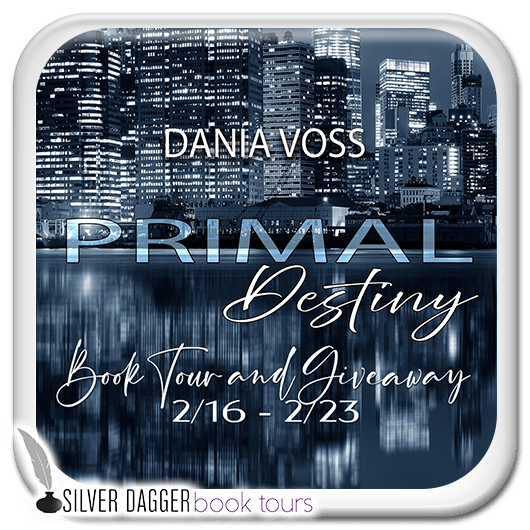
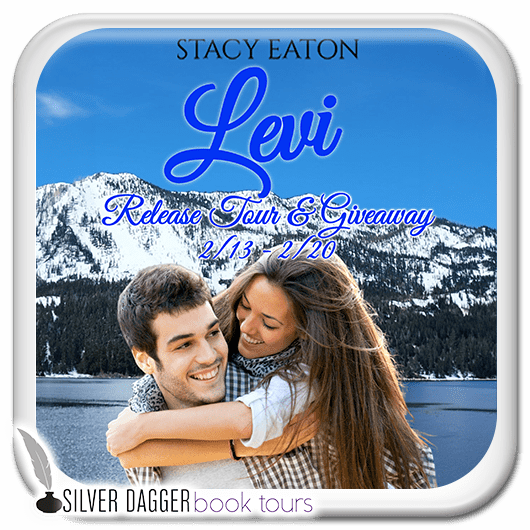
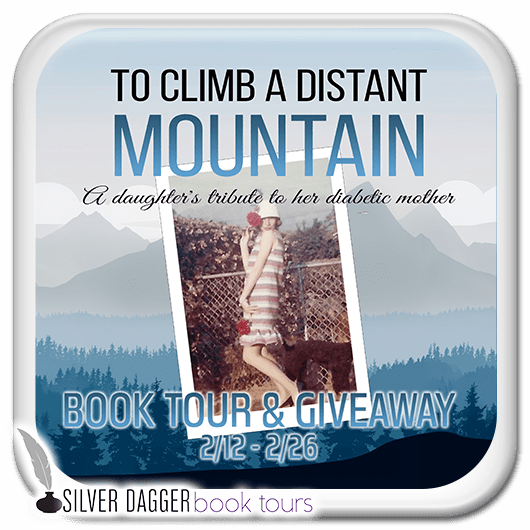
Thanks for the great excerpt and interview. The book sounds very interesting. Love the cover!
This looks like my kind of book
when did you know you were a good writer?
Great question, Jeffrey. It takes time, and I don't think there was one moment when I knew this. Instead, my confidence steadily grew the more I wrote. I still have so much to learn, and there are days when I think I should give up (!), but I love writing too much to do that.
This sounds like a great read.
I like the cover art. Looks great and sounds like a good story.
Looks very exciting Do you write in a daily journal?
Hi Heather! I used to write daily, but I haven't done that in a few years. That said, I'd love to get back into the routine of doing that. Writing for a few minutes each morning is very grounding.
This book looks intriguing
I like the story line and the title. Thanks for the chance.
It looks like a good book.
A lot of people equate a large size person (child, teen or adult) with brute strength, with emphasis on the 'brute'. It is good to have recognition that the perception is often incorrect, as well as showing how it can lead to both unintended consequences and inner strength growth.
Carol, I couldn't agree more. This is really well said. Thanks for your comment!
I am curious to read this one because of the title.
This sounds like a really interesting book!
the excerpt sounds really interesting, nive cover too
Eye catching book cover.
Great cover & title.
I am intrigued by the excerpt.
I'm glad to hear it, Soha. There are many more interesting layouts inside!
Looks like a good book.
Sounds like an interesting read.
Sounds good
Hi Glenn,
I just wanted to say how much Goon stuck with me. I didn’t expect a story with such grit to also have so much heart, but you pulled it off in a way that felt real and honest. The characters reminded me how complicated people can be—and how much hope can come from the most unexpected places. Thank you for writing something that hits hard but still leaves you thinking long after the last page.
Thanks so much for the kind words, Thomas. It means a lot. I'm really glad to hear that you enjoyed Goon.
Please consider posting this as a review on Goodreads and/or Amazon. Every bit helps to spread the word and get the book into more readers' hands. Thanks!
I enjoyed reading the guest post. Thank you for the giveaway!
I like the book details.
Sounds like an good read
This sounds like an interesting book and I also like the cover.
Oh my this is a powerful read!!
Thank you for the excerpt.
This is an interesting book. I think it would be very popular with young adults!
I'm hearing such good things about this one, can't wait to read!
I can not wait to read this book. It sounds like a great read